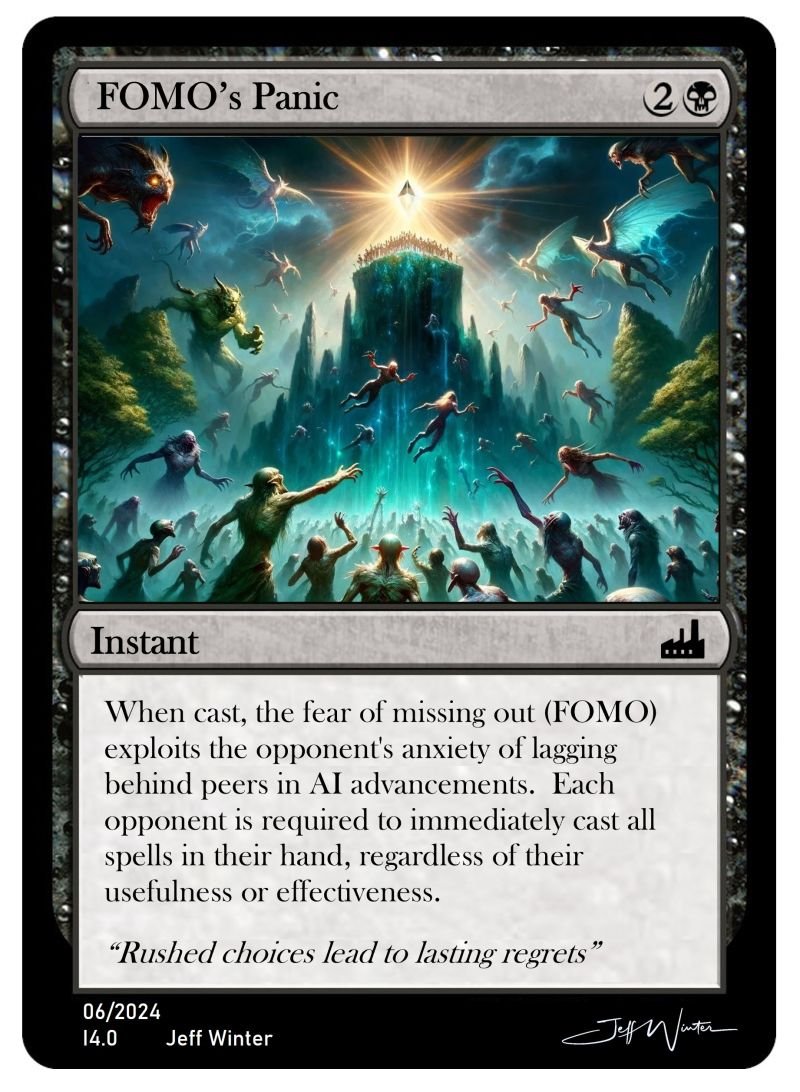FOMO’s Panic
Caught between hype and hesitation? Don’t let FOMO make you cast all the wrong spells.
FOMO’s Panic: This card isn't just any ordinary spell; it taps into the deepest recesses of your mind, exploiting your anxiety about lagging behind in the latest AI advancements. Suddenly, you're forced to cast every spell in your hand, regardless of its usefulness or effectiveness. Every. Single. One.
Understanding FOMO and Its Consequences
FOMO, or the Fear of Missing Out, is a psychological phenomenon that can lead to rash decisions and impulsive actions. In a business context, FOMO can create a sense of urgency and panic, compelling companies to adopt new technologies or trends without thorough evaluation. This reactive approach can lead to wasted resources, ineffective implementations, and ultimately, missed opportunities for genuine innovation. According to Ardoq in their 2024 CIO Report, 61% of CIOs say FOMO is one of the main reasons they invest in emerging technology.
Generative AI as the Ultimate FOMO Trigger
Generative AI has taken the world by storm. From creating art to writing poetry, and even composing music, it seems there's nothing this technology can't do. The hype is palpable, and as a manufacturer, you might feel the pressure to jump on the AI bandwagon immediately—or risk being left behind.
Actionable Advice to Navigate FOMO in AI Advancements:
Assess relevance to your business: Not every AI advancement will be relevant to your manufacturing processes. Take a step back and evaluate how generative AI specifically can benefit your operations, whether it's in product design, quality control, or supply chain optimization.
Start small, think big: Instead of overhauling your entire system, start with small, manageable AI projects. This could be as simple as automating a specific task or implementing AI-driven predictive maintenance. Small successes can pave the way for larger implementations.
Invest in continuous learning: The AI landscape is ever-evolving. Encourage your team to stay updated with the latest trends and advancements through courses, webinars, and industry conferences. Knowledge is power, and staying informed can help you make better decisions.
Collaborate with experts: You don't have to go it alone. Partner with AI experts and consultants who can provide insights tailored to your specific needs. Their expertise can help you navigate the complexities of AI implementation effectively.
Focus on value: Before diving into any AI project, conduct a thorough cost-benefit analysis. Understand the potential return on investment and prioritize projects that offer the most significant impact on your bottom line.
References:
Ardoq - CIO Report: Emerging Technology Adoption 2024: https://www.ardoq.com/blog/ardoq-releases-cio-report-emerging-technology-adoption-2024

